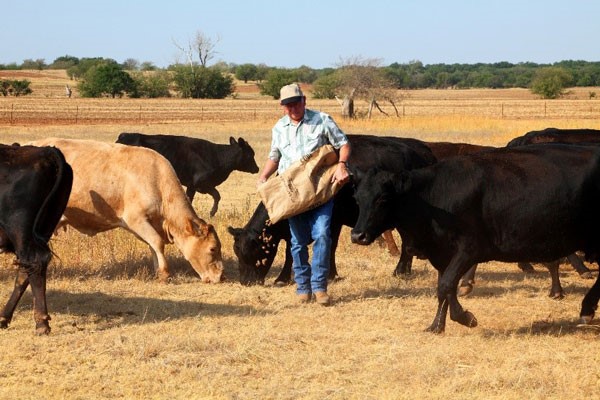Supplementing stocker cattle during grazing can improve production efficiency
Study finds feeding dried distillers grains cubes during grazing does not negatively affect feedlot performance.
December 12, 2023

Raising beef cattle is complex, and the beef industry and animal scientists devote considerable resources to understanding and optimizing the changing nutritional needs of cattle to ensure peak animal health, producer profitability, and consumer satisfaction. A new study, published in Applied Animal Science, is adding to our understanding of stocker cattle nutrition programs. The research--conducted by a team from Oklahoma State University and Texas A&M University--demonstrates that supplementing stocker beef steers with dried distillers grains cubes during backgrounding on pasture has the potential to boost weight gain, while not affecting feedlot performance, and ultimately improves carcass quality and overall profitability for producers.
"We know from extensive previous research that adding supplements--like dried distillers grains--to the diet of stocker cattle on pasture is an effective management strategy to improve animal performance and overall productivity," explains the study's lead investigator, Paul Beck, PhD, of the Department of Animal and Food Sciences, Oklahoma State University. "But less is known about how these stocker supplementation programs impact the whole beef life cycle, including the subsequent feedlot performance and quality of meat produced. We felt it important to understand supplementation impacts to the whole production system, especially for those farmers keeping their cattle from backgrounding through the finishing phase."
Over a period of 2 years, Beck and his team studied crossbred steers grazing a mixture of tall fescue and bermudagrass, with some receiving compact and durable dried distillers grains cubes in their diet. The steers were randomly assigned to one of nine pastures, and each pasture was randomly assigned to one of three supplementation treatments including fertilized pastures with no supplementation, fertilized pastures with steers fed supplemental dried distillers grains cubes three days per week, or steers on unfertilized pastures supplemented with dried distillers grains cubes five days per week.
After the grazing period each year, animals were sent through the finishing phase and the team carefully evaluated their feedlot performance, including weight gain, dry matter intake, days on feed, feed efficiency, and overall costs, along with final carcass characteristics to understand carryover effects from their diets during backgrounding grazing.
"We saw that, over the two-year study period, the steers receiving pasture supplementation gained weight more rapidly and were heavier at the end of the grazing season," says Beck, opening up the possibility that this kind of supplementation might effectively replace nitrogen fertilization of pastures. "Our results also indicate that animals with dried distillers grains supplements required fewer days on feed in the feedlot and that grazing supplementation did not negatively affect the cattle's subsequent feedlot performance and, in fact, tended to result in higher beef quality grades at finishing."
While Beck cautioned that more research is needed and that the nutritional value of dried distillers grains cubes can vary, the study results overall point to supplementation on pasture being an enhancement that increases producer profitability and overall net returns, especially when producers retain ownership through finishing.
The article appears in the December issue of Applied Animal Science.
You May Also Like



